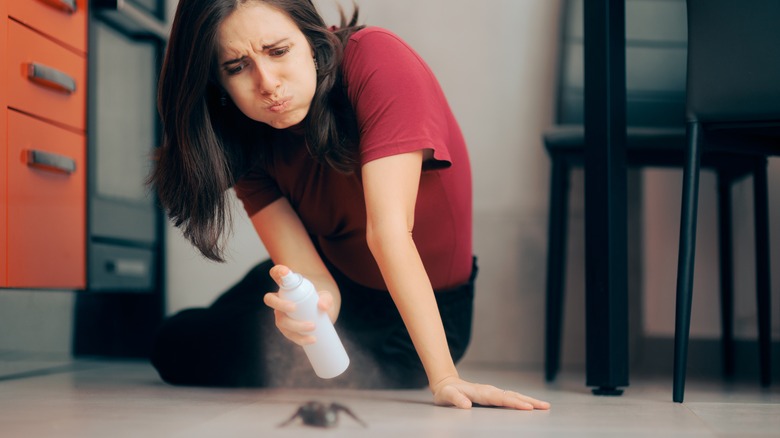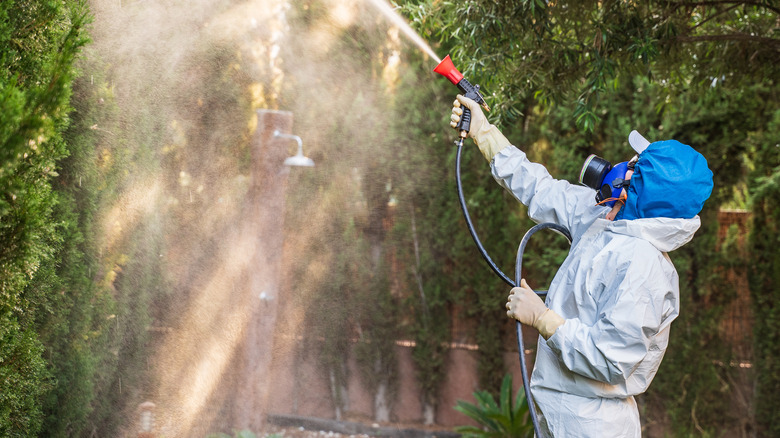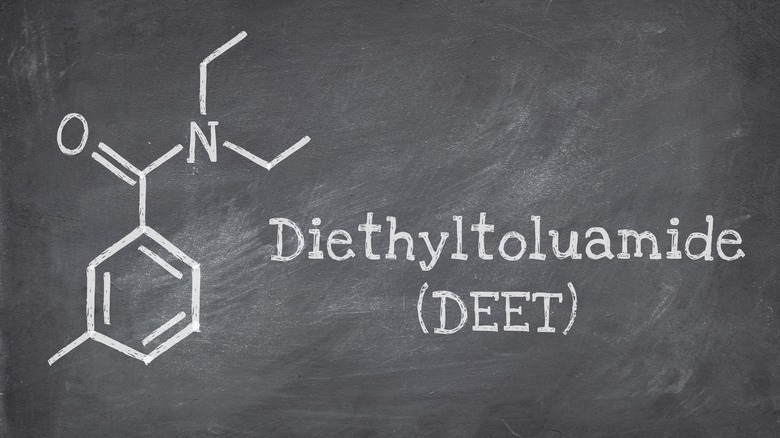The Right Way To Dispose Of Insecticides
Flying, crawling, stinging, buzzing, biting, and potentially disease-carrying insects have long been the targets of annoyed humans. Bug killers and repellents are the weapons of choice in this never-ending battle, but they must be used with care. As with any other product containing chemicals, there are right and wrong ways to dispose of these insecticides.
Rachel Carson's 1962 "Silent Spring" publication sounded the alarm on chemical pesticides and their misuse. In 1972, the book ultimately resulted in the United States banning the widely used but hazardous dichloro-diphenyl-trichloroethane (DDT). Safer insecticides, notably products containing diethyl-meta-toluamide (DEET) and Picaridin, are now the standard. However, though relatively benign, they should be applied and discarded following regulations and label instructions, per The Centers for Disease Control and Prevention (CDC).
Similarly, insecticide containers, sprays, and wipes should be handled cautiously. Ignoring safety precautions and disposal protocols can injure the handler and damage wildlife, plants, and waterways. There are effective ways to control insects without resorting to chemicals, but if you persist in using those toxic substances, get rid of them with care.
Disposing of insecticides
Only intended insects should be harmed by the chemicals meant to kill or repel them. Insecticides are considered household hazardous waste and need to be handled as such. They can be disposed of at a collection center, and some cities have regularly scheduled collection days or events. When transporting for disposal, make sure the insecticide is packaged carefully. Earth911 recycling search tool is an informative database to learn more, as is the EPA-sponsored National Pesticide Information Center. You could also dial 1-800-CLEANUP (1-800-253-2687) for help.
Insecticides must be kept from entering waterways or ventilation systems and away from heat. They cannot be thrown away with your household waste. According to RecycleNation, nor should they be buried, burned, or poured down a drain or toilet. Avoid rinsing empty bottles, as the insecticide residue will go down the sink. Containers cannot be recycled unless your local program allows them, and you must prepare and clean them as instructed, per the Pesticide Environmental Stewardship. Never reuse or refill an insecticide container, but an empty aerosol can is permitted to go in the garbage.
Do not hoard pesticides and only purchase what you need. Simply using the insecticide as directed until the container is empty is an excellent way to dispose of it, instructs the Appalachian Mountain Club. You might also give any excess to your neighbor. HomeSteady suggests emptying a nonaerosol spray into a kitty litter container, and the insecticide will solidify in it, and the litter can be taken to a landfill.
DEET vs. Picaridin
DEET and Picaridin are today's primary insecticide components. Though relatively harmless to humans, they must be appropriately handled and disposed of carefully. DEET is used in hundreds of products, with millions of pounds sold each year, and it counters illness-bearing mosquitoes and ticks. According to the CDC, safely in use since the end of World War II, a significant DEET spill will still have to be contaminated using a solution of sodium hydroxide. DEET has a strong smell and is a solvent capable of dissolving plastic, including your sunglasses and some clothing items.
Picaridin is a synthetic derived from the plant that produces table pepper. It, too, is deemed safe for use as an insecticide against mosquitoes, ticks, and chiggers but requires some precautions. Per the Tender Corporation, if spilled, it must be soaked up with an absorbent that will not react with it. The absorbent and contaminated liquid must then be discarded, taking standard precautions.
There are several natural insecticide alternatives that do not require special disposal procedures — citronella, soybean and cinnamon oils, basil, and lemon, to name a few. They may be less potent than DEET, Picaridin, or other chemical deterrents but also are less harmful to humans and the environment.


